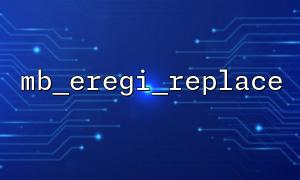In PHP, the mb_eregi_replace function is used for performing multi-byte character regular expression replacements while ignoring case sensitivity. It is particularly useful for handling UTF-8 and other multi-byte encoded strings. However, in practical usage, if the input string contains illegal characters (e.g., unescaped special regex characters), it can lead to regex match failures or errors.
This article will explain how to preprocess the string before using the mb_eregi_replace function to avoid issues caused by illegal characters that could make the regular expression fail.
The first parameter of mb_eregi_replace is a regular expression pattern, the second parameter is the replacement content, and the third parameter is the string to be processed.
Example:
<?php
$text = "Hello World!";
$pattern = "world";
$replacement = "PHP";
<p>echo mb_eregi_replace($pattern, $replacement, $text);<br>
?><br>
Output:
Hello PHP!
However, if $pattern or the string to be processed contains unescaped special characters, the match may fail, or even trigger warnings.
Special characters with meaning in regular expressions include:
. \ + * ? [ ^ ] $ ( ) { } = ! < > | : -If any of these characters appear in the pattern or replacement string, they must be properly escaped.
PHP's built-in preg_quote() function can escape special characters in regular expressions. However, since mb_eregi_replace uses the mbregex extension's regex (not the preg_* series of PCRE), the escaping rules are slightly different. Nevertheless, preg_quote still escapes most special characters correctly.
Example:
<?php
$pattern_raw = "hello.world"; // . is a special character
$pattern = preg_quote($pattern_raw, '/'); // Escapes to hello\.world
<p>$text = "Hello World! hello.world test.";</p>
<p>echo mb_eregi_replace($pattern, "PHP", $text);<br>
?><br>
Output:
Hello World! PHP test.
If you're concerned that the string to be processed may contain control characters (such as non-printable characters) that could cause match failures, you can filter them out using a regular expression:
<?php
// Remove non-printable characters, keeping only common characters and Chinese, etc.
$clean_text = preg_replace('/[^\P{C}\n]+/u', '', $text);
The following example demonstrates how to first escape special characters in the pattern and preprocess the replacement string to remove illegal characters before calling mb_eregi_replace:
<?php
// Strings and pattern to replace
$pattern_raw = "foo.bar?"; // Contains special characters . and ?
$replacement = "PHP";
$text = "Hello foo.bar? world! \x01\x02"; // Contains control characters
<p>// 1. Escape special characters in the pattern<br>
$pattern = preg_quote($pattern_raw, '/');</p>
<p>// 2. Preprocess the text, removing control characters<br>
$clean_text = preg_replace('/[^\P{C}\n]+/u', '', $text);</p>
<p>// 3. Use mb_eregi_replace for replacement (case-insensitive)<br>
$result = mb_eregi_replace($pattern, $replacement, $clean_text);</p>
<p>echo $result;<br>
?><br>
Output:













